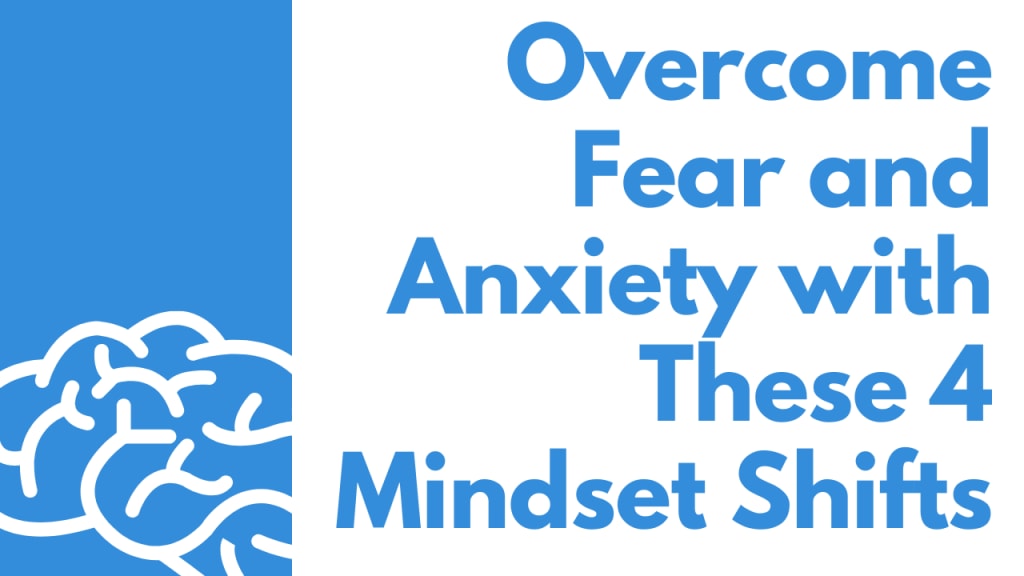Overcome Fear and Anxiety with These 4 Mindset Shifts
4 Mindset Shifts

Overcome Fear and Anxiety with These 4 Mindset Shifts
When it comes to anxiety, your subconscious mind learned to cause feelings of worry, unease, and stress when a specific trigger was pulled. It’s different for all of us, but if your trigger is public speaking, for example, your automatic reaction after being told about it could be a knotted stomach, dread, and images of you failing or looking nervous. And those images are played over and over again.
Take a moment and think back to a time in your life — your first ever memory of feeling anxious, scared, or judged in some way. You might struggle to think of this consciously if it’s a particularly painful memory. That’s something the conscious mind has the power to do (not the subconscious). It can prevent the immediate recall of painful memories so that you don’t have to feel that pain again.
However, sometimes we need to address them, but it’s more effective to do so in a trance-like state during mediation or hypnosis, so you can really remove those conscious limitations…because your subconscious remembers everything. It remembers being bullied at school. It remembers when you struggled to make friends. It remembers that traumatic car accident. Whatever it might be, your subconscious filed that memory along with the pain associated with it, and it’ll do anything it can to stop you from feeling that pain again.
How does it do that? It makes you feel anxious, of course! The more anxious you feel, the more likely you’ll refrain from facing that pain again. Anxiety is actually trying to help you, but if you’re still reading, then chances are anxiety is not doing anything good for you now.
It’s preventing you from living a happy and free life where you can make friends easily, or get up and speak confidently, or feel relaxed in everyday situations, etc. Knowing all you know now, you’re well on the road to overcoming fear and anxiety. The next step is putting it all in action.
Mindset Shifts to Overcome Anxiety
First, to learn how to overcome fear and anxiety, you need to reflect on some situations that might have led your subconscious mind to form this understanding – everyone’s different, and your brain has created this reaction for you solely because of something it heard, saw, or felt in the past.
If you really struggle with this part, therapists (particularly hypnotherapists who specialize in communicating with the subconscious mind), can lend a hand here. Then, in order to change the pattern, you need to change it at a subconscious level – by shifting your mindset – and there are few ways you can do this.
1. Hypnosis
One of the most effective ways to reprogram your subconscious mind is through hypnosis. It’s a trance-like state, similar to meditation, where you can dialogue with your subconscious mind and give it positive suggestions.
During hypnosis, your brain waves shift from beta to alpha, meaning your subconscious mind is open and willing to listen to new thoughts and ideas. Hypnosis is not scary, and it’s not mind-control. It’s a direct way to talk to the subconscious, and it’s something you can do with a certified hypnotherapist or RTT therapist, or you can simply find the hundreds of free downloadable resources on the internet that can help you shift your mindset.
2. Creative Visualization
Start meditating. Ultimately, the more you practice calming yourself down, the better you’ll be at it. Visualize yourself in the state in which you’d like to be. See yourself living calmly, happily and confidently – see it in great detail. Spend some time every day doing this with a good soundtrack and you’ll see that your thoughts and your mindset will begin to change.
3. Change Your Language
Stop identifying with anxiety and fear. If you’ve ever said, “my anxiety,” “I’m an anxious person,” or “it’s just the way I am,” then you’re owning it. Anxiety and fear are NOT who you are – it’s just something you do, and that’s ok. Soon it’ll be something you used to do (i.e. say “I feel anxious sometimes” instead of “I’m an anxious person” or “I have anxiety”).
4. Self-Talk
Did you know that your mind will believe to be true anything you continually say to it? If you tell yourself every day that you’re bad at public speaking or you always get anxious at work, then guess what? That’s exactly what’s going to happen.
Whether you write it down or say it aloud every day, list out the attributes of the person you want to be and tell yourself every day, for as long as it takes, that you’re that person. You’ll see just how effective this is.
When you identify the cause of anxiety and fear, it’s important to say thank you. Speak to the anxiety:
“I understand why you came into my life, but I know now that I attached the wrong meaning to [event], and I no longer need to believe that I’m [not good enough/different/a bad communicator]. Today I’m deciding that I don’t need it anymore. Anxiety no longer serves me.”
Final Thoughts
These are genuine, proven methods that not only reduce anxiety but will help you overcome it for good. Your brain is malleable, and it can change. You just need to tell it how you want it and be gentle with yourself. You’re only human!
About the Creator
Enjoyed the story? Support the Creator.
Subscribe for free to receive all their stories in your feed. You could also pledge your support or give them a one-off tip, letting them know you appreciate their work.





Comments
There are no comments for this story
Be the first to respond and start the conversation.